#COMPLACENT CONSUMERISM IS A NIGHTMARE
Explore tagged Tumblr posts
Text
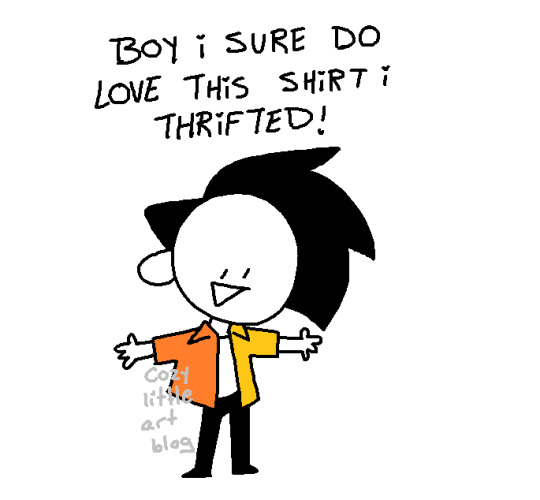
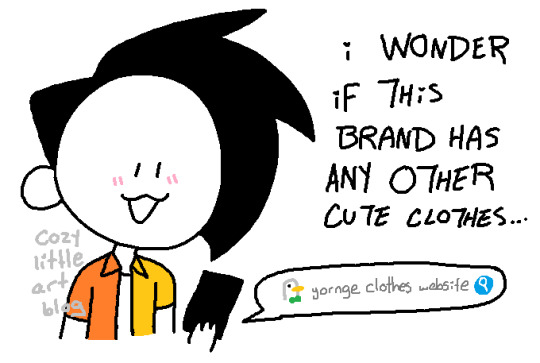
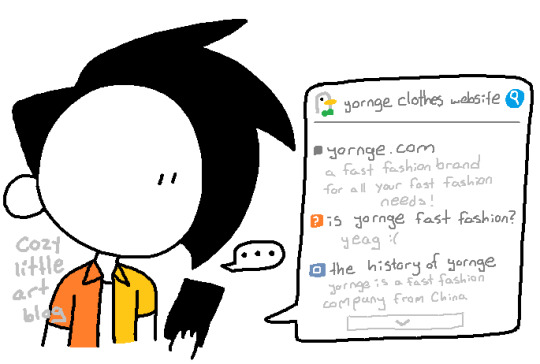
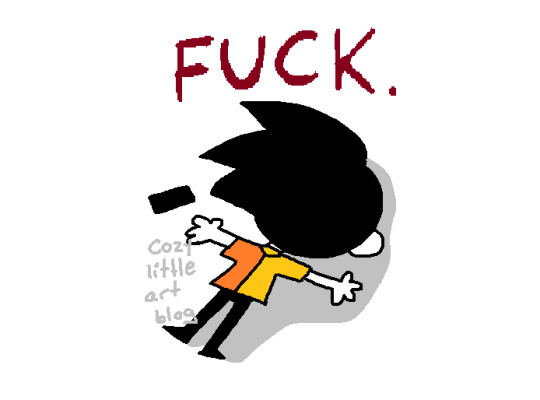
yeah like having to deal with the obnoxious middle aged women who thrift to resell wasn't bad enough, now we got the braindead fast fashion bozos cluttering things up too.
its ok shirt, i will love you like somebody else apparently couldn't even if you shed microplastics into the water supply and will fall apart after 7 wears. and then i'll sew you back together like anyone with two braincells to rub together Should
#doodles#ms paint#thrifting#fast fashion#anti shein#anti fast fashion#dat me#life is paint#art#reminder that learning to sew is incredibly easy you can do it on youtube in two minutes#machine sewing? five minutes. for the bare fucking basics.#stop buying on chinese fast fashion websites. stop buying from American brands who upsell you on fast fashion. learn to mend your clothes#stop trying to follow trends that last 2 weeks and find your Own Style because then you'll always be confident and happy with what you wear#buy natural fibers when possible. wool is so durable and will keep you so so warm in the winter#IM GOING TO START BITING PEOPLE !!!!!!!! IM GOING TO START BITING PEOPLE#COMPLACENT CONSUMERISM IS A NIGHTMARE#AAAAAAAAAAAAAAAAAAAAAAA#i made that up btw. yornge is not real. i didnt want to say the real brand. fuck 'em#do i need to start googling the brands i find in the thrift stores now. jesus christ
431 notes
·
View notes
Text
Rhetoric of Space: “The Jewel of the BnL fleet.”
The place in which a story is set has a very important role in sending the greater message of a movie. It describes the way society and a culture interact, and the way the ideas and beliefs of a culture affect a society. The time can bring a crucial piece of information because it provides background for why the society believes and behaves a certain way. Depending on how far back a story is set in the past, the characters may believe in witches and demons, they may see technology as a privilege instead of a necessity and everyday part of life, or there could be a complete shift in the atmosphere of the cities, regions, and people if the story is supposed to reflect a war zone or a time of recession and economic decay. In contrast, if the story is set in the future, the possibility is unlimited and the future can be bright, vibrant, and full of curiosity, or it can be bleak, frightening, and a dystopian nightmare. The context for which a story takes place communicates the boundaries and possibilities limited and given to the main character. The “space” of a story can be vividly shown, implicitly relatable, or explicitly diverse from the world the viewer is accustomed to. Great examples of space being an essential piece to describing a story are Willy Wonka’s Chocolate Factory, The Simpsons Springfield, Alice’s Wonderland, Coraline’s the Other World, and Peter Pan’s Neverland, but the one being analyzed today is the Axiom from WALL-E.
The machines were never meant to destroy the humans to become powerful. AIs fought that battle in the Incredibles and learned that the fastest way to be the dominate the human race was not through violence or physical confrontation. It was to play it safe and provide the humans with something only machines can provide - perfection. Through constant attention and alleviation of the nitty-gritty, mundane everyday activity, machines were able to hit the humans were it hurt without the humans being aware of it. The society and culture of consumerism became their downfall as the humans became to see the machines’ efficiency and competence for perfection as a norm. As this laziness progressed the planet began to suffer and the humans panicked at the very last moment. Their solution - like every other time they had been confronted with a problem - escape/run away from the problem and rely on machines. They built the axiom as a massive, luxury cruise ship meant to feed, entertain, and reflect the population of the people inhabiting said ship’s lifestyles.
The creation of the ship on its own is a testament to the culture and society. The literal meaning of its name is “something that is taken for granted.” The viewers are able to see the true emotion the ship gives to the humans when they travel with WALL-E aboard it for the first time and see the qualities and attributes associated with keeping the humans happy. There are all sorts of amenities to cater to the every need of each of the inhabitants aboard, and according to the lifespan of the captain, there has to be working in the humans’ favor. However, if the viewer looks closer, he or she will see the persuasive techniques used to sell this idea of a dream world to the humans on the ship. Pathos would be using the desires of the consumer culture to make the humans not want to do anything for themselves. Why should they if everything is taken care of at a faster and more efficient rate by a machine? The ethos would be the AUTO’s explanation of how he was programmed to do his job, and since the humans had been following - subconsciously - the word of the machines without question for centuries, the credibility the machines had far outweighed their curiosity that something might be amiss or that life was too good to be true. Logos is a simple explanation. The Earth, as far as the humans know, is uninhabitable, dirty, and filled with trash that they would have to remove if they returned. The axiom has kept the humans safe and happy for centuries. The question a lot of skeptics might ask is why fix something that’s not broken?
When being introduced to WALL-E for the first time and his daily routine on the desolate planet Earth, the viewers feel broken, lost, empty, and sorry for the world that they know now and what many warn it will become. When viewer aboard the axiom, they see the privilege, the laziness, the unhealthiness, and the carnivorous consumerism that is materialistic convenience. The viewers’ opinions may be split between wanting to experience that same paradise and judging the people for their body shapes, lazy tendencies, and entitled mentality. The Earthen society aboard the axiom in WALL-E is one that places convenience over practicality and independence. The culture of people is very lazy, machine-dependent, and unhealthily complacent with not having control over its people’s own lives.



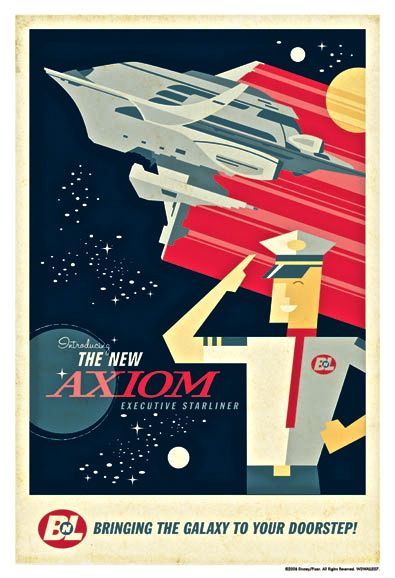
3 notes
·
View notes
Text
The Seduction of Money
This is probably one of the LARGEST issues facing our species in this modern age. Everyone is consumed by it, they spend all of their time and energy in the pursuit of it, and it has been tied into our survival so deeply that it has caused a necrosis in our societal structure. Parenting has taken a back seat for many because the struggle to survive on the wages of honest work is a very real thing. Housing close to work is expensive, healthy food is expensive, and things like running water, heat and electricity also come at a price. The part that nobody mentions is that the price you actually pay is not measured in dollars and cents as much as it is paid for with life; That precious and limited resource that is measured in the limited amount of time you get to spend on this earth learning, experiencing and growing your consciousness.
In order to more deeply understand the basis of this human sickness, we must first take a look at the structure of the institution that runs the money system and its resulting economies. The currency itself is not backed by any substance or resource that has real value in the world. The paper its printed on has various fibers in it like cotton and silk along with the ink and security features, but for all intention and purpose, its value is nothing more than the material it is made from. BUT...This is where it gets tricky, because we all know you need money for everything...right? Yes, and no. The idea of money on its surface seemed like a solid one. Trading goods and services for a sort of voucher that can be used to obtain needed items goods and services from others. Its light to carry and it doesn't spoil the way food might. As we grew in numbers and population size, we needed a way to be able to stream line the idea of bartering.
While good in concept, the largest advantage to currency also became the worst failing. It never spoils and it takes up no space. Where people couldn't conceivably or effectively take more than their share or more than they needed with the barter system, they now had something that was perfectly collectable. It eliminated the situation where if you took more food than you needed it would spoil out from under you. So let the competition to have it all begin!
Skip ahead a few generations to the birth of the central banking idea. Many of our founders, our forefathers knew the dangers of this institution, and spoke out against it, got in its way and tried to derail it with speeches and little bits and pieces of our constitution put into place to PROTECT us from a centralized bank. They knew and understood the dangers than came with it because it was exactly the same sort of tyranny that existed in England. It was the root cause of the oppression they rebelled to escape from. This is one of those tidbits in American history they sort of skim over and don't talk about, because to truly educate our children about history could cause them to take a look at the present and wonder about the future. Our founder KNEW that the central bank was trouble, that was why they left, that was why they rebelled. They refused to continually be taxed to pay for the interest on the loans, taken out by the English crown to pay for wars.
All history lessons aside, lets dig into the way the system works a little bit...
The first thing to understand is that the way they (the owners of the central banks) operate left utterly no room for ANY other outcome than the one we are looking at, and they knew this when they crunched the numbers and started taking excessive measures to put it into place. They had lots of money when they first started, they loaned out the money they had to those who had a need for it and charged “interest” for loaning it out. Interest is just a fancy word for getting money simply because you have enough to lend to others. Hold on to that idea for just a moment, I will come back to it.
Lets take a look at another commonly accepted concept...Inflation.
First, what is it and how is it measured? If you have 1 lb of gold (or kg if you are actually on a sensible unit of measurement based on even numbers that end in 0s), the idea of currency USED to be based on gold that existed. you could take bank notes at any time and trade them in for the amount of gold expressed on the face of the note. The amount of gold was the value it was based on. Back in the 1900s there was a forcible seizure of all the gold in our country enforced by threat of prison. This was the beginning of the nightmare we live now. Once the central bank had physical ownership of all the “value” behind the money, i.e. gold, they then started producing more and more and more of these “credits” to represent the same value. For the sake of illustration, consider a checking account that has 1000$ in it, you can write as many checks as you like, but they must all be for the same amount. The more of them you write, the less each one individually will be worth. That is what inflation is, and what it is caused by. The checks represent every dollar in circulation.
What does this have to do with everything you may ask? What does this have to do with any of us. The answer is both more complicated and more simple than anyone realizes. The central bank has grown by loaning money to our government and to other smaller banks, with interest of course, but that alone wasn't enough. The money they loan is created out of thin air, making the money already in circulation worth less. and not only do they get that back when the loan is repaid, but even MORE because of the interest. (told ya id be back ^^) The equation ends up coming out with everyone in debt. Forever. The money to repay the debt does not and can not ever exist, because to pay it back, there would need to be more than there is, and would increase the debt more because of the interest attached. Catch 22 with all of humanity footing the bill in the name of a few greedy individuals.
Okay, you may be saying “this makes sense, but how does that cause x, y and z?” Well, like this...Big money protects its interests 1st and foremost. To understand how deep the rabbit hole goes, it is important to understand that there’s only one major corporation in all the world that deals with the manufacture and distribution of weapons of war...bombs, planes, tanks, and guns. Funny enough, they are run by the same group of people who graciously provide loans to our government to pay for these implements of war. They manage and fund news stations that focus on the stories they are told to air. Yes, LIBERAL AND CONSERVATIVE ALIKE. I don't care about your politics or opinions on matters not personally or universally relevant, and they will not be featured here. If you are still so attached to these force-fed ideas that have been artificially imposed by a never ending barrage via media and internet, feel free to continue to read or not as you choose, BUT I wont be baited, and if its an idea you have that you want to impose on another or not something affecting us as a whole species, you won’t be indulged or fed. But...I digress.
Basic truth about all animals, including humans: When their basic needs for Food, shelter, and Social contact go unmet, they do not behave the same way they normally would. They fight, lash out, steal, kill. We are all meant to love and support one another, invest our energy in science, art and creativity, and technological break through. We are not being fairly compensated for the labor we provide as a population. The only thing there is a shortage of is the money itself, and the life experiences we are getting f*cked out of trying to get what we need to survive.
So what is the answer and what can you do personally? Take a stand. Do what you can to plant fruit and nut trees, potted tomatoes, whatever you can from where you are. Garden. If you don't know how, learn, use the greatest tool available to our species right now, the internet. Don't buy their crap, physically and emotionally...spiritually. Boycott their poison foods and their corporate farms that are killing the bees and making us sick to make even more money. Pay off your credit cards and cut them in half, swear off loans of all kinds. Avoid consumerism. Buy only things you cant craft for yourself, and avoid disposable items. Talk to your family, help the children understand that we cannot continue to spend whole lives working to make the rich richer. Every time we punch a clock and don't get the value from the work we have done, and every time we spend those meager dollars on stuff others in the same position have crafted, we are feeding that monster. what you can do is simple...Work for someone else only as much as you need to, and spend only on those things you cant do the labor yourself and reap the rewards. Barter your skills to others who have different skills. Reconnect in your towns, cities and neighborhoods, show them what they can do to help change the world, or at least their corner of it. Be the change you wish to see. The key to ending the enslavement is severing the dependency that allowed it.
The universe is calling to us all, will you answer that call, or will you be just another of the complacent subdued masses entranced in escapism and convinced you have no power?
0 notes